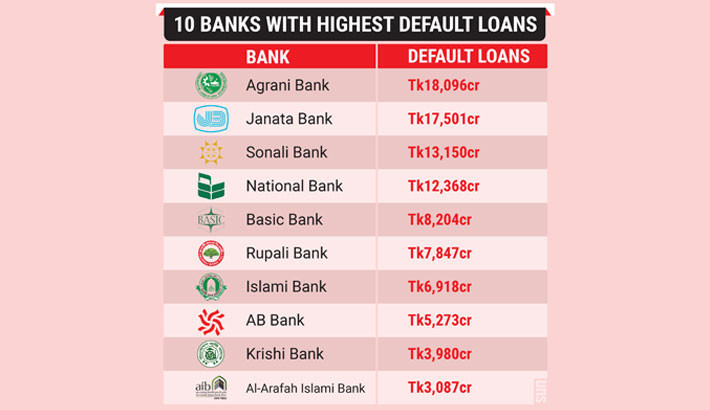Only 10 banks out of 61 in the country hold more than 66% of all non-performing loans (NPLs) in Bangladesh, says a Bangladesh Bank (BB) report.
Out of the 10 banks, four are state-owned commercial banks, while the remaining six are private commercial banks.
There was a time when the NPL conversation would revolve around the bad conditions of state-owned banks. Now, private banks are also being discussed.
According to BB data, the total default loan in the banking sector stood at Tk1,45,633 crore last year, which was 9% of the total outstanding loans.
However, the top 10 banks’ defaulted loans stood at Tk96,426 crore, which is 66.21% of total defaulted loans.
Dr Salehuddin Ahmed, former governor of the Bangladesh Bank, said since the central bank is not getting much success in reducing defaulted loans, it has to be stricter.
“If the defaults cannot be reduced, the branches of those banks should be ordered to be closed,” he suggested.
He also said if banks fail to maintain the required provisions, they are at risk of falling into capital shortfalls. Banks need to ensure adequate provision for the protection of customer deposits.
Dr Zahid Hussain, former lead economist of the World Bank’s Dhaka office, told the Daily Sun the default loan figure as shown in the Bangladesh Bank report is much lower than the actual amount.
“We have implemented a liberal model to control NPLs. Rescheduling loans and regularising from one-time defaults by making partial payments – these opportunities were repeatedly given. The time has come to be strict with large and repeat defaulters,” he added.
Recently, the central bank finalised a roadmap to bring down default loans below 8% by June 2026 to ensure corporate governance in the banking sector.
Who is at the top?
The list of banks, defaulting more in percentage and not in amount, is topped by the National Bank of Pakistan.
Last December, 98.22% of the bank’s total loans were in default, followed by ICB Islamic Bank at 86.91%, Basic Bank at 63.76%, Bangladesh Commerce at 51.65%, Padma Bank at 46.39%, BDBL at 42.46%, National Bank at 28.92%, Agrani Bank at 25.89%, Rajshahi Krishi Unnayan Bank at 21.37%, and Janata Bank at 10.20%.
Although there are more defaulters in these banks in terms of amount or quantity.
Agrani Bank’s NPLs loans have decreased, but the bank still holds the top position in defaulted loans. At the end of December, Agrani’s defaulted loan stood at Tk18,096 crore.
Janata Bank, which holds the second position, has defaults of Tk17,501 crore.
Sonali Bank has Tk13,150 crore, National Bank Tk12,368 crore, and Basic Bank Tk8,204 crore of defaulted loans, respectively.
Additionally, Rupali Bank, in the list of top 10 banks, has Tk7,847 crore, Islami Bank Bangladesh Limited Tk6,918 crore, AB Bank Tk5,273 crore, Krishi Bank Tk3,980 crore, and Al-Arafah Tk3,087 crore of bad loans.
National Bank on top of provision deficit
The provisioning shortfall in seven banks against their potential bad loans stood at Tk24,188 crore at the end of 2023.
Among the seven banks, National Bank faced the highest shortfall, Tk11,698 crore.
The remaining two private banks’ shortfalls stood at Bangladesh Commerce Tk385 crores and Standard Bank Tk231 crore, respectively.
Of the four state and specialised banks reporting shortfall after December, Basic Bank posted the highest provisioning deficit of Tk5,195 crore, followed by Agrani Bank’s Tk4,341 crore, Rupali Bank’s Tk2,273 crore deficits, and Probashi Kallyan Bank’s Tk67 crore.


